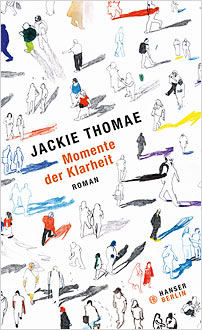review
Moments of Clarity is a real page-turner with excellent characterisation and a great deal of humour.
Jackie Thomae’s novel presents readers with manifold variations on the theme of love lost – and sometimes found. Set in the milieu of educated, middle-class Berlin, each chapter focuses on one of the book’s twenty main characters, who, it emerges, are all connected by friendship, love or familial ties. As the title suggests, Thomae focuses on personal epiphanies where her characters see the truth of their situation for the first time and decide either to act or accept it. Lydia’s ardour cools on her second tryst with her husband’s best friend Viktor, when she sees right through his fatherly tone. Hendrik realises that he was always only a bad copy of his wife’s ex-husband and their fairy-tale marriage is over. And on seeing her therapist of three years from a new, unflattering angle, Maren finally gets to the root of her problems all by herself. Ironically, the ‘moments of clarity’ described in the book are often realisations that nothing is clear-cut. The description of the break-up between Engelhardt and Susanne in the first chapter captures their ambivalence, which coexists with the certainty that the relationship has run its course.
The characters all crop up in different chapters, and part of the book’s humour derives from these contrasting glimpses into their lives. In the chapter dedicated to him, we see Schubi as lazy and louche, smoking a joint and thinking the thoughts of a pubescent boy. Yet in a later chapter, his brother-in-law Bender has a very different impression. In the only chapter that features all of the characters, Bender marries Serafina, Schubi’s sister. Here we find all the ingredients for a hackneyed wedding description: a huge age gap between the bride and groom, bitchy women, longwinded speeches, boisterous children, embarrassing rituals, and all kinds of intrigues. But Thomae’s treatment of this episode is far from jaded, and genuinely funny.
The novel’s characters are well drawn and very believable. Dialogue features strongly and this is another source of the novel’s humour, when what the characters say is juxtaposed with what they’re thinking and how they are moving. Thomae handles the themes of loss and profound change with a light touch but without cynicism, and offers us a very convincing portrayal of the lives and loves of today’s thirtyand forty-somethings.



All recommendations from Autumn 2015